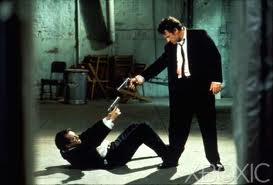14 ways to develop characters your readers will love
23 Wednesday May 2018
Tags
12 Years a Slave, Birgitte Nyborg, Borgen, Chiwetel Ejiofor, Hanibal Lecter, Harvey Keitel, Mikael Birkkjær, Paddington Bear, Philip Christensen, Reservoir Dogs, Sidse Babett Knudsen, Solomon Northup, Tim Roth
Or develop characters they’ll hate… envy… admire… care about…

Chiwetel Ejiofor as Solomon Northup in 12 Years a Slave
Character is at the heart of every story – whether for stage, screen or printed page. A film, book or play can be brilliantly written, exquisitely plotted, full of clever ideas, but if we develop characters that people care about, nobody will buy.
But character development is not easy. It takes time and psychological insight.
We want to meet characters who excite us. They may be lovable – or despicable. Paddington Bear or Hanibal Lecter. But, as the man said, it don’t mean a thing if they ain’t got that swing.
When I began writing, I was constantly being told to develop my characters more. However I didn’t know how.
I decided I needed to work hard to develop my own character writing skills. And I don’t regret a single minute I spent on them.
Here are 14 inspiring ways that I use now to get my characters to come vividly to life.
1. Questions develop characters
Ask the character questions and get him or her to answer you in their own words. Get him to talk about himself. What does he know, think, feel? How does he see himself? How does he see others?
It’s a great way to develop characters and find their personal voice as well as strengthening your own ear for dialogue.
The questions and ideas that follow will take you even deeper. Add any more that you wish.
2. Outside in or inside out
You can develop characters essentially in two ways – from the outside or from the inside. Which do you prefer? Some people like to start with the outside and work inwards. They are like actors who get into character by finding the right nose or pair of shoes. Others prefer to begin with internal questions and work outwards. There’s no right or wrong way, do what works for you.
3. What do others say about me?
Ask the characters to talk about each other. Some characters will be better at talking about themselves than others. That’s why you need other points of view.
4. What do you say about me?
And of course you, as the author, may know things that nobody else knows. However, be careful not to become too detached or even judgmental. When you develop characters, keep them as personal and emotionally engaged as possible.

Sidse Babett Knudsen as Birgitte Nyborg and Mikael Birkkjær as Philip Christensen in the Danish political TV series Borgen
5. Looks develop characters
Characters reveal themselves through how they look. How do you dress? How tall are you? Weight? Colouring? Eyes, nose, way of holding yourself? Do you try to look younger than you are, or older? Most importantly – how do you feel about that? This final question should be asked after all the questions that follow. It’s through their feelings that your character will come to life.
6. What do I own?
We define ourselves through our possessions. Do you have a fast car or a rusty old bike? What’s the most expensive thing you’ve ever bought? What possession do you love most? Least? And – as always – what do you feel about that?
7. Get the character’s sound
Personally, I only start to get a character once I can hear them speak. That’s why asking questions is so important. Does one speak clearly and another mumble? Do they have accents? Do they speak with confidence or are they afraid to open their mouths? (And of course, how do they feel about that?)
8. Style is substance
Some people are fast, others slow. Yet others tend to be cool, thoughtful, aggressive, etc. How do you tend to approach things? How do you respond to different situations?
9. We all need a CV
Develop a character CV. The tiny details in our lives make us what we are. Often they can stimulate ideas for scenes, lines of dialogue or whole plot lines. Get the character to tell you her upbringing, school friends, parents, memories, jobs, relationships and so on.

Harvey Keitel as Mr. White and Tim Roth as Mr. Orange in Reservoir Dogs
10. What about your future?
And don’t stop there. What do you want to happen? What are you afraid of? Do you plan ahead or take everything as it comes? Do you contemplate your own death or live for the next night out with your mates?
11. Values are valuable
Values go the very heart of what you believe in. It’s important to know what your character thinks is important in life. These are going to motivate everything he does. One kind person will die to save the rain forests, while another is more concerned about avoiding going to the gym. Write down the four or five values that he holds important in life.
12. How do you make things happen?
Scene by scene, a good character will try achieve their goals. But we all have different strategies and tactics. Knowing what they are for each character will bring your scenes vividly to life.
Maybe Evelyn goes about things obliquely. She works round to what she wants. While Yorath is blunt and direct. He says what he wants, and doesn’t care if he rubs people up the wrong way.
Imagine putting them both in a scene together, having to respond to each other’s ways of doing things. Maybe even try something new. Talking of which…
13. Push your characters to their extremes
Human beings generally take the easy way if they can. The writer’s job is to make things difficult. It’s perhaps the writer’s most important job of all. What are your characters really capable of doing if pushed?
Would they lie? Steal? Kill? What would be their personal limit? Under what circumstances? Fascinating, engaging characters are pushed to the very edge.
For one that might be saving the planet. For another, wearing a brightly coloured dress would break all their taboos. Some will survive. Some won’t. But we’ll remember them. And we’ll care.
14. Try the snapshot exercise
To tie all these questions together, cast your character using a picture in a book, magazine or website. This should be a photograph of a real person (ie: not an actor or model playing a part). Cast each part as if you were a casting director. Then use the pictures as a spur to get your characters to talk about themselves.
I have a full article on this powerful technique.
Work through all the questions, and more. You’ll be amazed what happens when you start to bring them to life.
And tell me how it goes.
More articles on how to develop character strongly:
8 ways to make your characters come vividly to life
How do writers come up with character names for their scripts?


Tell people what you think